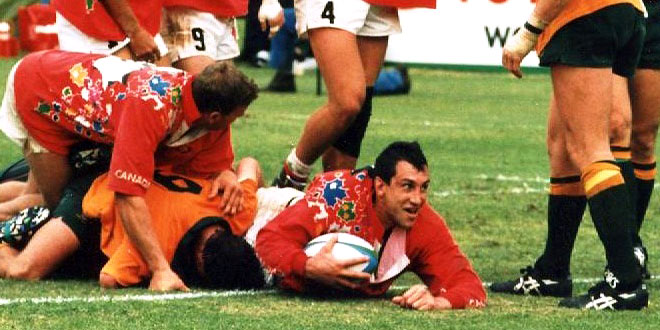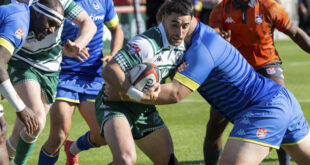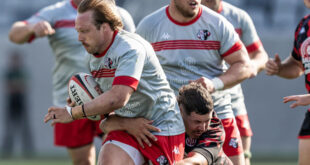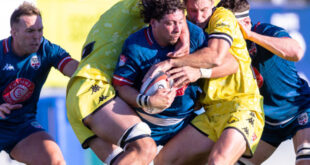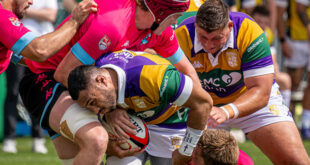Canada face off against USA at Twin Elm Park on Saturday, so who better to talk rugby with than Ottawa’s favorite son, Al Charron! The former national captain is now Manager of Player Advancement for Rugby Canada, working closely with the country’s carded athletes as well as helping with alumni relations, not to mention his continuing role as an ambassador for the sport. Al took time out of his busy schedule to speak with Americas Rugby News about the World Cup, the challenges of professionalism, and of course playing against the Eagles.
Gareth Rees recently spoke about how truly amateur the World Cup was in 1991, giving the example of players having to get permission to take another week off work in order to play the All Blacks in the quarter final. How much has the tournament changed in terms of scale since then?
Gareth is absolutely right, it was a different time then. I was lucky, I was working for the government at the time and had all the possible dates booked off, but some of the guys did have to call in and do some begging for more time off once we got pass the pool stages.
The tournament itself in ’91 was interesting, it was spread out over the home unions, but our pool was in France. The people were great, very welcoming, but we hardly knew were in a World Cup until maybe the quarter final- up until then it felt pretty much like regular test matches with no real fanfare. I think the media grasped the fact we had played alright to get to that stage and started to give us a bit more coverage and the fact that we were playing New Zealand of course did not hurt.
South Africa in the 1995 RWC was a totally different feeling, it really opened my eyes to how big the RWC was and could be. The marketing and organization, everything was on a much, much bigger scale, and of course the political situation in the country at the time just added to the occasion. We were staying in Port Elizabeth and the people there were just incredible, they adopted us as if we were their own. It was an amazing experience and really felt like a professional tournament, even though true professionalism didn’t start until the following year.
Wales hosted in ‘99 but again we were based in France and we felt a bit out of the loop of the and didn’t really feel like we were part of the main event. It certainly was different feel then 1995, not terrible but just not quite the same…. but Australia got it right in 2003. Everything was top notch at that tournament as one would expect and the ones to follow certainly seem to be the same case. I was also part of the management in 2007, and it was another step forward in regards to RWC being this huge world sporting event. I’m still upset at myself for not sorting myself out to get to New Zealand in 2011. I understand from talking to many who did go that it was fantastic.
Is it a bit of a shock for a Canadian player to experience that kind of rugby-mad environment, and then to come back home where it’s still something of a niche sport?
It’s not really a shock, for me it was just a pleasure, a real privilege. You’re treated like a professional athlete, a star in some ways in rugby loving countries and you just enjoy the moment. Of course it’s not the same here in Canada where the sport is not in the top 5 sports like it is in places like NZ, UK and France but things are changing. One does not play rugby to get recognized but I probably get recognized more now than I did when I was playing for whatever reason.
I feel like the sport of rugby is really on the cusp of bigger things here in North America, so maybe that gap in popularity is just closing a little bit. Of course a lot of our guys now are professionals overseas, and some are on the sevens circuit, and with rugby on TV so much more – the the internet and the promotion of our national athletes by Rugby Canada – we are starting to see a greater following of the sport here in Canada. The rugby community here in Canada has always been great, smaller than in other countries perhaps but now growing and that of course is fantastic on many fronts.
Being part of the only Canadian team to make a World Cup quarter final, what do you think was the difference between 1991 and Canadian teams since?
That’s an interesting question, the 1991 team was indeed special but the 1995 RWC side was perhaps just as good but we were in the pool of death with South Africa and Australia and did not advance.
Talking about ’91, we had a world class flyhalf and kicker in Gareth [Rees] and Mark [Wyatt], and a big tough pack, but at that level everyone is big and everyone is tough. We actually played a style that suited our players abilities. In 1995 we played a bit more of an open style and in fact based on stats from that RWC we – of all teams – had the ball in play percentage wise the most of any team which was interesting to se given the style we had played in 1991.
We were very confident heading into 1991. I was part of the tour to New Zealand in 1989 and we were getting beaten by provincial sides, but it was a great experience and we got a lot out of it in regards to being better individually and as a team. We had beat Argentina twice the previous year as well as Japan, Scotland, and the US in the months before the tournament We had high expectations of ourselves and fortunately things worked out for us.
We let ourselves down a bit against France, and then let New Zealand off to a great start in the quarter final. If we hadn’t been so overawed in the first ten minutes against France it could have been a different day. New Zealand we were never going to win but we were no pushovers either and gave them a good run that night. It’s always an honour and a pleasure to test yourself against the best. An interesting point – we actually outscored the All Blacks [10-8] in the second half. Small victory!!
When 1995 came around we had a similar group of players. We didn’t have as much momentum and were missing a few guys through retirement and injury and had taken a thumping from the All Blacks in a pre RWC match, but we were in the midst of playing a more open style, working out some kinks and starting to play some exciting rugby. We thrashed Romania by a bigger score than South Africa, and despite the scoreline played pretty well against Australia. We were hard pressed playing against the defending World Champions in the Wallabies but held our own.
Against the Springboks we ended up with zero on the board, but we’d passed on a few easy kicks that Gareth would make in his sleep and opted to go for tries instead. It’s a testament to the excellent Springbok defense then and throughout the tournament that we didn’t get over the line. Everyone remembers the brawl from that match but it was really a hard fought match in more ways then one!
That was a special group of players, no question, but I don’t think it’s fair to compare those Canadian teams with the teams of today. The game has changed so much both on and off the field. Every team of today that Canada will be fully professional, and while we have a growing number of overseas pros, we still have players who do not compete week in and week out at a high level regular intense matches, or as high a level as our opponents do. There is no comparison even at the highest level of Canadian domestic rugby to a pro league club game, let alone something like the Heineken Cup.
I think we had some success in the amateur years but it is difficult to compare the amateur year to the professional years. Today’s Canadian team faces tougher, far better prepared sides then we ever did. Of course we had our challenges in our day, but so do they.
In that respect I think those early ‘90s teams played above the belt, and those are unrealistic expectations to have where things stand right now. The full time pros that make up their respective sides in international test matches are used to 80 minutes of intensity every game, and have the depth to bring on other players with not much drop-off. I’ll back our guys to stand with anyone for 60-plus minutes, as athletes and in terms of physical strength we’re right with them, but it’s the other 20 where our concentration dips a little and one mistake at that level can kill you. You need your players from 1 to 15 to be switched on the whole time, and now you’d have to say 1 to 23 the way the game is played. Ironically our depth is better than ever, talent base better but it has to still grow considerably to match major rugby playing nations.
Even heading into 1999, Canada was in transition of grasping professional rugby with a number of our guys still working jobs and trying to train so as to play at the highest level. We were asking many of our players to step up against guys who had been training rugby every day for four years. Thank God we had the CCSD program at the time to bring in some new blood who had received more daily training and good coaching then what previously existed or we would have been in real trouble. I think maybe we need to start looking at something like that again.
You’ve played against the Eagles on 16 occasions. Is there really any difference in mentality heading in or is it just like any other test match?
On one hand it’s like any other time you pull on the Canadian jersey, you want to be at your absolute best and win of course, but there is something a little different when you play against the Eagles. It’s kind of like competing against your brother or your cousin. I got to know several of the American players pretty well over the years, great guys and athletes but they don’t want to lose to us and we don’t want to lose to them. You don’t like to ever lose but losing the Can Am match is a tough pill to swallow!
I think we hold the overall lead in the win department but they have now beaten us two matches on the trot. There’s so much potential there, and if rugby ever takes off as it looks to be doing at present, it would be a game changer for international rugby and its pecking order. I want USA rugby to succeed….just not when they play Canada!
Of course being from Ottawa we have to ask you about Twin Elm Park. You had the chance to play at there for Canada in three tests. Beating France in ’94 especially must be a career highlight?
Absolutely. What an amazing day that was. It wasn’t a weak French side by any means, that was a full strength France team with guys like [Olivier] Roumat and [Abdel] Benazzi and [Philippe] Sella, who went on from Canada to beat the All Blacks twice in New Zealand just a couple weeks later! I was talking to some of the guys the other day about that actually, and about how the crowd spilled out onto the pitch and swallowed us up after the game. They were chanting ‘We beat France!’ over and over. Great atmosphere and great memories.
Canada is such a big country so any time you get to play in your home town it’s something special. I grew up playing rugby at Twin Elm so to play there against England in ’93 and then France was such a thrill. I then had the honour of leading the team against Uruguay in ’96. Thankfully we won against a tough bunch, that is another great memory of mine.
I think the place will be packed this weekend and the fans will really get into the game. If I’m honest, though, it’s probably time we moved on from there in playing test matches. It’s great for club rugby but in this day and age you really need to have a professional stadium for your teams, sponsors, and fans. We only have so many home games a year, and if we’re putting 10 to 20 thousand people into BMO Field in Toronto, it is much more conducive to play in venues like BMO. That’s just the economic reality of it. We would have been better served playing at TD Place in Ottawa, and I understand the reasons why it isn’t, which hopefully down the road will get resolved.
You played with Jamie Cudmore in 2003, he is now set to join a select group of Canadians by playing in his 4th World Cup. Given the way the game is and how he plays, did you think he would last that long?
[Editor’s note: Charron, Gareth Rees, Mike James, and Rod Snow each played in four World Cups. Dave Lougheed traveled to four but did not make an appearance in 1991]
That’s a big achievement for Jamie, it’s great to see him still with the team. He and I have some similarities in that regard, but he is a mountain of a man and much stronger then I ever was at any stage of my career! He’s had some concussion problems in the last few months (I can relate to that as well!) but I spoke with him the other day and he said he’s ready to go. People have always said he’s carved from granite, and that’s still true, so that’s probably a big reason why he’s made it this far.
Of course it would have been great to see him in the Canadian jersey a bit more, but that’s another reality of having to send our best professional players overseas.
There were a few other guys who came close to four tournaments as well. Mark Cardinal missed out on ’91 but was there in ’87 and again for both ’95 and ’99. Eddie Evans was a tough cut just before ’99, just like James Pritchard this year. It’s an honour to play in one World Cup, so to play in four really takes some effort, and probably a bit of luck!
Are there any players in particular on this year’s team you look forward to watching?
There are so many great young players to choose from. I have a huge amount of respect for both our national captains John Moonlight and Tyler Ardron. John is a world class sevens player and an inspiration on the pitch, he’s so fit and mentally strong. Tyler is still a young man but already has a presence about him, he’s a special talent.
I enjoy the skills that Nathan Hirayama brings to both teams, and of course Jeff Hassler is so exciting to watch. Taylor Paris has so much speed, Phil Mackenzie, Harry Jones… we could be here for a while so I’ll just leave it at that. The new generation of players are better athletes than we were and have so much talent. It’s great to see the future is in good hands.
The team is going through a bad run of late but I am hopeful things are coming together in time for them to show their class come the RWC in September and October.
Lastly, what were your initial thoughts when you saw the 1995 World Cup jersey?
Ha! Wow. There were two press conferences held to announce the jersey. I was part of the leadership group so I was invited to attend the one in Toronto. I hadn’t seen the jersey and didn’t know anything about it until 10 minutes before the thing started. I was aghast. I mean it had pink and yellow and blue leaves on it… It was designed by someone who had no idea what rugby was or anything about us and it was just terrible, but I couldn’t say that at the press conference, so I just had to bite my tongue and say nice things instead.
There was the red version, the white one was a little better but still poorly designed, and poorly put together. I don’t know how many jerseys I went through in that tournament, I probably used at least two in the first half alone of every game. I remember picking up the ball and getting tackled by Willie O[fahengaue] against Australia, and he just tore the shirt right off, I was running around the field at one point bare chested. I guess those things are collectors items now. There can’t be too many left after how many we left in South Africa!
I’m a traditionalist, my favorite was always the ’91 jersey with the dark red and a white maple leaf over our chest. We’ve had some interesting designs since that haven’t been too bad. I’m glad to see Under Armour is headed back towards that old design. They’re a great company and the jerseys themselves are fantastic quality, so we’re very happy to have them on board.
Thanks Al!
Al Charron won 76 caps as a lock or back row for Canada between 1990 and 2003. He is tied with Gareth Rees for most matches as captain with 25, leading the team to the 2003 World Cup. He was also a member of the 1991, 1995, and 1999 World cup teams. Follow Al on Twitter at @TheBlade27
 Americas Rugby News Rugby news from across the Americas!
Americas Rugby News Rugby news from across the Americas!
